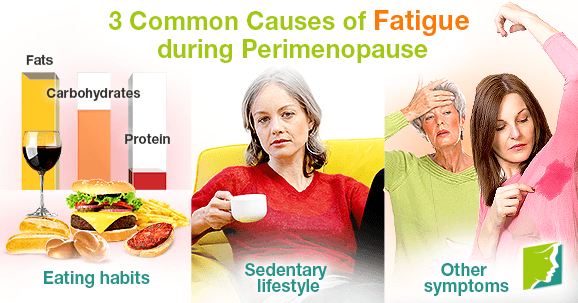Fatigue is a feeling of relentless tiredness, and in its worst form, does not go away even with sleep or rest. It often accompanies menopause, or, more specifically, the perimenopause stage. Perimenopause is defined as the years from the first appearance of menopause symptoms to one year after the very last period, and this can be as many as eight years in all, sometimes even more. Fatigue is one of the most common symptoms of perimenopause, and there are a number of reasons for this. Keep reading for more information about fatigue, perimenopause, and why they often occur together.
Fatigue
Fatigue affects up to 80% of perimenopausal women, and can be so severe that a woman cannot even get out of bed in the morning. Symptoms that often accompany it are:
- “Brain fog” - trouble organizing thoughtsMuscle pain
- Poor concentration
- Sensitivity to light
- Headaches
- Insomnia
- Depression
Perimenopause
Perimenopause is the period of time leading up to menopause when the body experiences many changes, mostly hormonal in nature. Each woman will have a different experience of menopause, with some experiencing many or severe symptoms, and others experiencing mild or even none. The normal age window for perimenopause is 45 - 55, although it is possible for some women to begin perimenopause earlier or later than this, and it usually lasts between two and eight years.
Common Causes of Fatigue during Perimenopause
The onset and intensity of fatigue can be affected by many factors, including bodily changes, lifestyle factors, and genetics. Keep reading for more information on the most common contributing factors.
Eating habits
Older people are far less likely to be eating enough protein than other age groups. This is an unwise thing to do if you are going through perimenopause, as protein is a nutrient known to stave off fatigue by providing long-term energy and contributing to muscle mass.
Sedentary lifestyle
As women get older, their lifestyles naturally become more sedentary, and lack of exercise is known to worsen fatigue. Exercise releases adrenaline, which will help to keep your energy levels higher in the long term. On average, an adult should be getting around 30 minutes of exercise a day.
Other symptoms
A number of other menopause symptoms can contribute to fatigue. These include hot flashes and night sweats, which can interrupt sleep and cause vaginal dryness, which can be uncomfortable and result in a lower mood and lack of libido. This, in turn, can lead to problems with a partner, causing anxiety. Sometimes, dealing with the other symptoms will mean a natural decrease in fatigue will generally follow.
Perimenopause-related fatigue is highly common and caused by a wide range of factors. As the underlying cause of fatigue itself is unknown, it is best to focus on symptom relief or treating the factors known to lead to it, such as bad diet or lack of exercise.
Sources
- Association of Reproductive Health Professionals. (2008). Perimenopause: Changes, Treatment, Staying Healthy. Retrieved October 9, 2014, from http://www.arhp.org/publications-and-resources/patient-resources/fact-sheets/perimenopause/
- Harvard Health Publications. (2014). Dealing with the symptoms of menopause. Retrieved October 9, 2014, from http://www.health.harvard.edu/newsweek/Dealing_with_the_symptoms_of_menopause.htm
- Harvard Health Publications. (2005). Perimenopause: Rocky road to menopause. Retrieved October 9, 2014, from http://www.health.harvard.edu/newsweek/Perimenopause_Rocky_road_to_menopause.htm
- Love, S. & Lindsey, K. (2003). Dr. Susan Love's Menopause & Hormone Book. New York: Three Rivers Press.
- Menopause Centre Australia. (2013). Fatigue. Retrieved October 9, 2014, from http://menopausecentre.com.au/Symptoms-Fatigue-menopause
- National Health Service UK. (2013). Chronic fatigue syndrome - Treatment. Retrieved October 9, 2014, from http://www.nhs.uk/Conditions/Chronic-fatigue-syndrome/Pages/Treatment.aspx
- National Health Service UK. (2013). Self-help tips to fight fatigue. Retrieved October 9, 2014, from http://www.nhs.uk/Livewell/tiredness-and-fatigue/Pages/self-help-energy-tips.aspx
- National Health Service UK. (2013). Symptoms of chronic fatigue syndrome. Retrieved October 9, 2014, from http://www.nhs.uk/Conditions/Chronic-fatigue-syndrome/Pages/Symptoms.aspx
- National Institutes of Health. (2013). Menopause. Retrieved October 9, 2014, from http://www.nlm.nih.gov/medlineplus/ency/article/000894.htm




